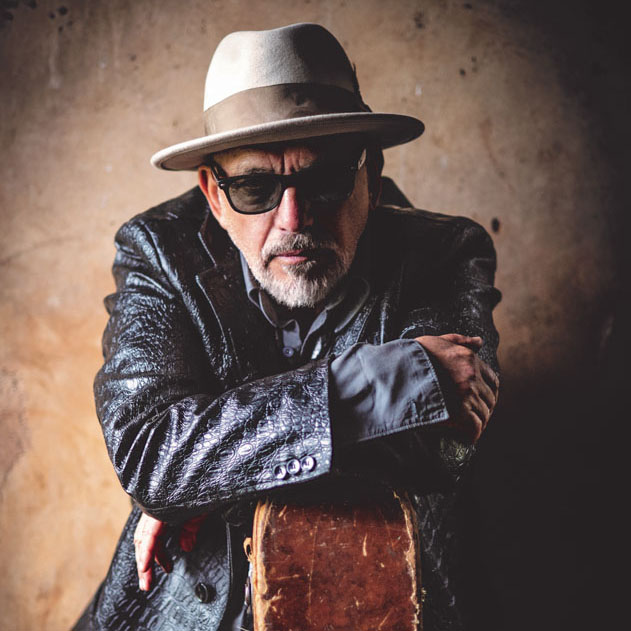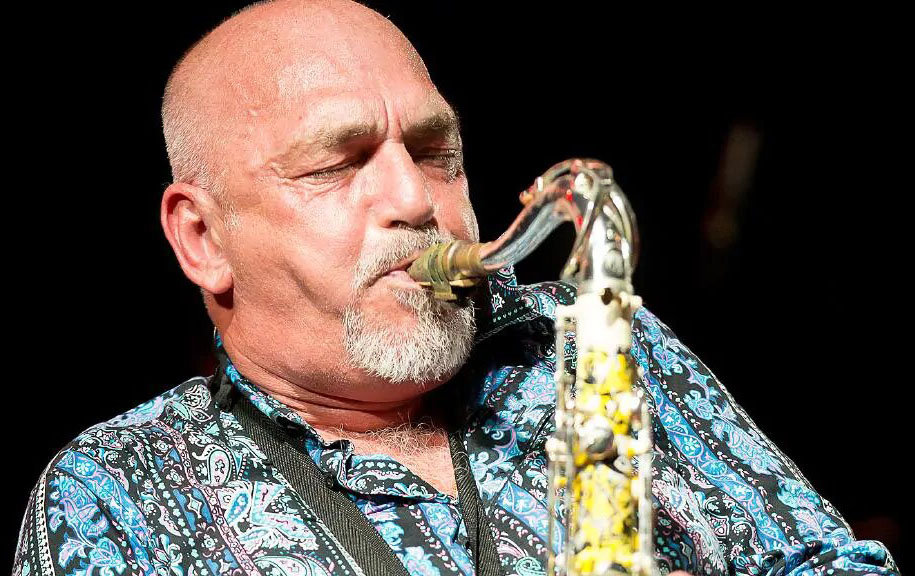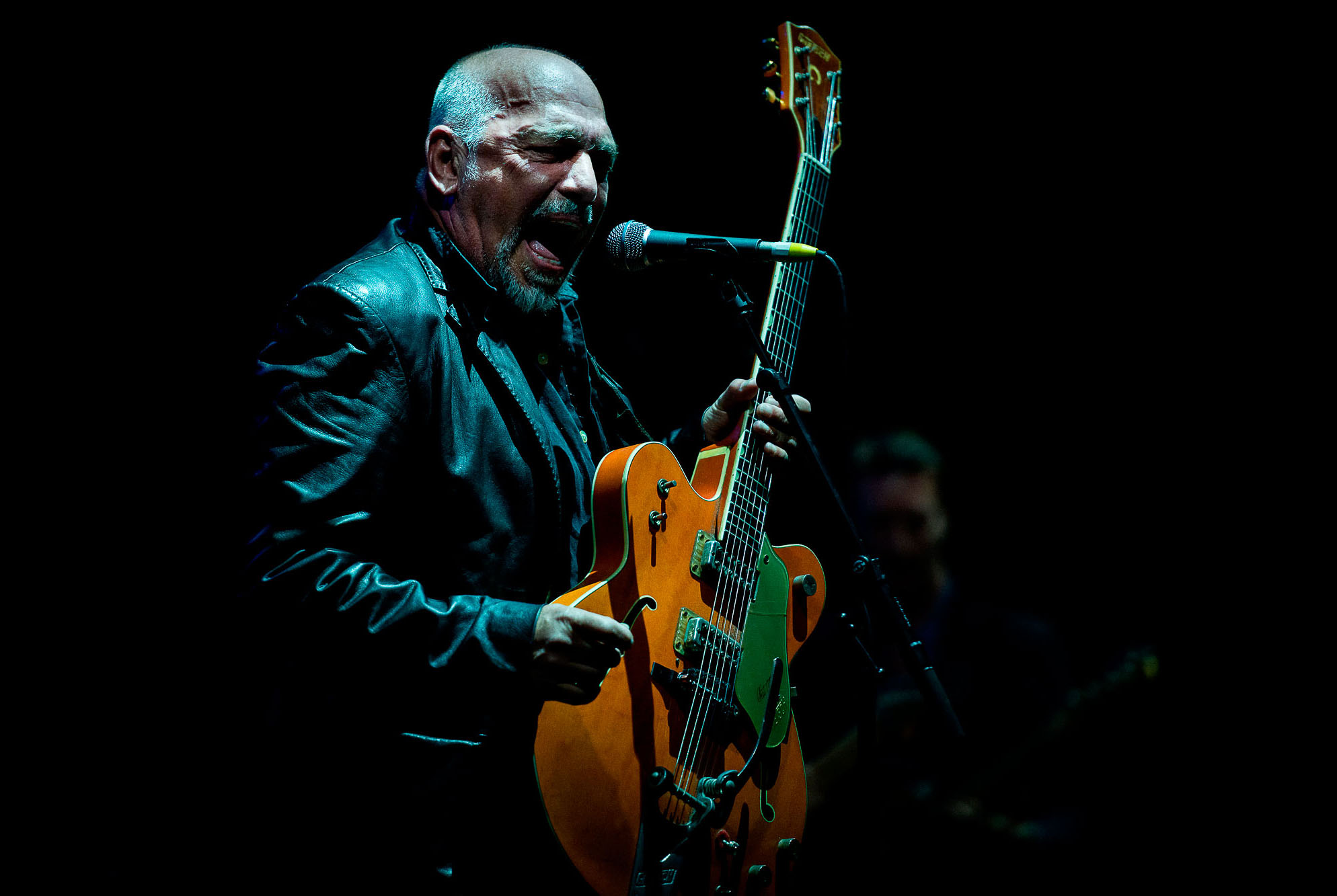Joe Camilleri is one of the most talent artist you are likely to find in Victoria. Now before opt on booking a few hours of his evening, you better know about the long shiny carrier.
It's nearly 30 years since Camilleri originally joined the Falcons of Wayne Burt and Jeff Burstin (both ex-Rock Granite) on guitars, John Power (from the Foreday Riders and Company Caine) on bass and former Daddy Cool drummer Gary Young - to record a version of 'Run Rudolph Run' as a Christmas single produced by Ross Wilson.
Even by that stage Camilleri was a local veteran, having played with mid-60's R&B band the King Bees, then the Adderly Smith Blues Band (which allegedly sacked him for sounding too much like Mick Jagger), Lipp and the Double Dekker Brothers, The Sharks and The Pelaco Brothers (with Stephen Cummings).
After recording the albums 'Don't Waste It' and 'Whip It Out', the mini-albums 'Loud and Clear' and 'So Young' (the title of which was covered by Elvis Costello) for Oz Records, the band - and its shifting cast of players - found themselves at Mushroom Records. By this stage Wayne Burt, one of the nations' great songwriters even then, had left - to be replaced by Tony Faehse (who had played in Alvin Stardust's band) - and the composing duties were thrown over to Camilleri and his colleagues. Soon afterwards, the ebullient Wilbur Wilde, who had been an integral member of Ol' 55, also joined the band.
The label move also teamed Camilleri up with producer Peter Solley who oversaw the hit singles 'Hit & Run', 'Shape I'm In' and 'All I Wanna Do' and the albums 'Screaming Targets' (1979), 'Hats Off Step Lively' (1981) and the 'Dexterity' mini-album (1981). The band toured overseas and even got to play at the Montreux Jazz and Blues festival.
But by this stage the sound of the band was changing and by 1982's sophisticated 'Cha' album and its hit single 'Taxi Mary' it was just Jo Jo Zep, minus the Falcons and plus Jane Clifton, Joe Creighton and others. Even a tour of America (which by all accounts was a disaster) failed to stop the eventual demise of the group. Ironically, Camilleri soon got back to his roots and went on to form the even more successful Black Sorrows. A brief national tour to support the 1984 compilation saw the Camilleri/Wilde/Burstin/Faehse/Power/Young line-up appear for the last time until that famed reunion in 2001 and the brand new album!
The Black Sorrows
Original line-up: Joe Camilleri (aka Joey Vincent, vocals, sax; ex-Pelaco Brothers, Jo Jo Zep and the Falcons), Paul Williamson (clarinet, sax), George Butrumlis (piano accordion), Wayne Burt (guitar, vocals; ex-Jo Jo Zep and the Falcons), Jeff Burstin (guitar; ex-Company Caine, Jo Jo Zep and the Falcons), Steve McTaggart (violin), Wayne Duncan (bass; ex-Daddy Cool, Living Legends), Gary Young (drums; ex-Daddy Cool, Jo Jo Zep and the Falcons)
Any examination of The Black Sorrows inevitable comes down to one person. Joe Camilleri (singer, songwriter, saxophonist, producer and the brains behind The Black Sorrows) is one of the most genuinely talented figures in Australian music. Maltese-born (in 1948), Camilleri got his start on the Melbourne soul and R&B circuit during the 1960s with bands like The King Bees and Adderley Smith Blues Band.
His appearances with Lipp and the Double Dekker Brothers, Sharks and The Pelaco Brothers in the early 1970s may have been legendary, but it was not until the formation of Jo Jo Zep and the Falcons in 1975 that Camilleri achieved national prominence. The Falcons earned a reputation as a red-hot live band and recorded a series of highly acclaimed albums and singles. Jo Jo Zep broke up in 1983 and Camilleri launched The Black Sorrows a year later. From humble beginnings playing zydeco, R&B and soul-inspired semi-acoustioc music around Melbourne's inner-city cafes, Camilleri transformed the band into one of the most sophisticated ensembles in the country.
For the first couple of years, Camilleri steered a shifting line-up of musicians (which included three ex-Falcons) through several relaxed and pleasant albums like Sonola, Rockin' Zydeco and A Place In The World. These early records concentrated on material such as Van Morrison's 'Brown Eyed Girl', John Lee Hooker's 'Don't Look Back' and Ray Peterson's 'Corinna, Corinna', plus an increasing number of Sorrows' originals. The band's early singles included: "What a Difference a Day Makes'/'Brown Eyed Girl' (June 1984, from Sonola), 'Shape I'm In'/'My Negress in Black' (March 1985, from Rockin Zydeco), 'Sons of the Sea'/'Gypsy Heart' (November 1985) and 'Country Girls'/'A Place In The World' (March 1986, both from A Place In The World), 'Daughters of Glory'/'Foolish Girl' (April 1987), 'Maybe Tomorrow'/'Dear Children' (June) and 'The Last Frontier'/'Wild Street Girls' (November, all from Dear Children).
Nick Smith (vocal harmonies, lyrics; ex-Millionaires, Kevin) and Peter Luscombe (drums) joined The Black Sorrows prior to recording A Place In The World, although the band still essentially featured a floating line-up. Guest musicians on that album included Joe Creighton (bass; ex-Billy T), Ross Hannaford (guitar; ex-Daddy Cool, Billy T), Andrew Pendlebury (guitar; ex-Sports), Ed Bates (guitar; ex-Sports) and The Blackberries (vocal harmonies), Johnny Charles (bass) and Mick 'The Reverend' O'Conner (Hammond organ) joined for Dear Children. Mick Girasole then replaced Charles on bass.
Dear Children represented a turning point in the band's career. Originally issued independently and sold only at the band's gigs, it reached the national Top 20 (#18 in June 1987) once CBS stepped in with a distribution deal. With the arrival of backing vocalists Vika and Linda Bull, and the establishment of a permanent line-up, The Black Sorrows issued the finely crafted albums Hold On To Me, Harley And Rose and Better Times. As well as Camilleri and the Bull sisters, the line-up around Hold On To Me (September 1988) featured Jeff Burstin, Wayne Burt, Mick Girasole and Peter Luscombe (Smith had left the touring band, but still contributed lyrics).
Hold On To Me peaked at #6 on the national chart in May 1989. It stayed on the chart for a year and sold 250 000 copies, as well as a respectable 150 000 units when issued in Europe and the USA. It produced five singles: 'Hold On To Me'/'Safe In The Arms Of Love' (August 1988), 'The Chosen Ones'/'Mercenary Heart' (October), 'Chained To The Wheel'/'Waiting For The Rain' (February 1989), 'The Crack Up'/'The Story Never Changes' (April) and 'Fire Down Below'/'Daughters Of Glory' ('89 remix)/'Come On In My Kitchen' (August). 'Hold On To Me' reached #24 on the national chart in October 1988, 'Chained To The Wheel' reached #9 in May 1989 and 'The Crack Up' reached #40 in June. The Black Sorrows also won Best Group at the 1989 Australian Record Industry Association (ARIA) Awards.
Richard Sega replaced Girasole on bass, and Jen Anderson (violin; ex-Kings Of The World) joined for the classic Harley And Rose (November 1990). The album yielded the excellent singles 'Harley And Rose'/'The Calling' (#24 in September 1990), 'Never Let Me Go'/'Never Let Me Go' (Swamp Mix) (#30 in April 1991) and 'Hold It Up To The Mirror' (June).
With heavy overseas touring (seven tours in 18 months) taking its toll on the band's resolve and stability, Burt and Girasole left The Black Sorrows in late 1991. Michael Barker (percussion) and Stephen Hadley (bass; ex-Kate Ceberano and The Ministry of Fun) came in as replacements. During May 1992 The Black Sorrows joined Beatfish, Deborah Conway, The Poor Boys, Kate Ceberano, Club Hoy and The Angels for the Wizards of Oz series of showcase gigs in Los Angeles. The band's next album, Better Times (October 1992), produced the singles 'Better Times' (May), 'Ain't Love The Strangest Thing?' (#46 in September) and 'Come On, Come On' (February 1993). Lyricist Laurie Polec had taken over from Nick Smith for Better Times. Like Hold On To Me before them, Harley And Rose and Better Times (Top 10 in April 1993) both sold over 200 000 copies.
In between his commitments to The Black Sorrows, Camilleri found time to issue the album Amazing Stories (December 1991) with his occasional country/R&B outfit The Revelators. The Revelators comprised Camilleri, Burstin, Luscombe, Joe Black (keyboards, guitar; ex-Mondo Rock), with help from the Bull sisters, Anderson, Barker, Garrett Costigan (pedal steel) and Venetta Fields (vocals). Amazing Stories produced two singles, 'What Does It Take (To Win You Love)?' (November 1991) and Bob Dylan's 'Caribbean Wind' (April 1992). Also included on the album was an elegant reworking of the Gram Parsons/Chris Etheridge tender-sad love song 'Hot Burrito #1'. For a short time, Amazing Stories and The Black Sorrows' Better Times were available as a Limited Edition two-for-one CD collector's pack.
In 1993, The Black Sorrows issued the CD EPs 'Sweet Inspiration' (July) and 'Stir It Up' (#58 in November). At the end of 1993, Camilleri dismantled the Bull sisters/ Burstin/ Luscombe/ Anderson/Barker/Hadley version of The Black Sorrows, and reconstituted the band as a solo act with supporting musicians. After a chance meeting with Kerryn Tolhurst (ex-Country Radio, Dingoes), Camilleri travelled to New York to record the Lucky Charm album, with Tolhurst co-producing.
Lucky Charm was a more reflective, rootsier collection than previous band efforts. It produced the CD EP 'Snakeskin Shoes' (#16 in AUgust 1994) and the singles 'Last One Standing For Ya' and 'Lucky Charm'. Ex-Noiseworks' frontman Jon Stevens sang a duet with Camilleri on 'Last One Standing For Ya', which reached #46 nationally in December.
In December 1995, Camilleri issued a solo CD EP, 'All Saints Hotel'. It was the only release since the 1986 cover of Kool and the Gang's 'Celebration'/'Wha'cha Gonna Do About It?' and 1989's 'Angel Dove' single to come out under his own name rather than The Black Sorrows' moniker. The CD EP contained a zydeco reworking of Chuck Berry's 'Run Rudolph Run', a song which Camilleri had previously recorded for the first Jo Jo Zep single in late 1975.
In 1996, The Black Sorrows released the triple live album Radio Waves which presented the ultimate Black Sorrows gig (36 tracks!). Also available was The Black Sorrows box set, containing the albums Sonola, Rockin' Sydeco, Dear Children and A Place in the World, plus Not for Production an exclusive 11-track compilation of rarites and never-before-released tracks. The box set brought The Black Sorrows full circle. In early 1997, Camilleri established a new, eight-piece line-up of The Black Sorrows that was inspired by a late 1960s New York-style of jazz/funk/blues as pioneered by Ramsey Lewis and Les McCann. The first release from the new Black Sorrows was the CD EP 'New Craze' (August 1997)



